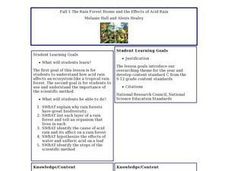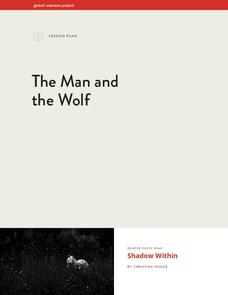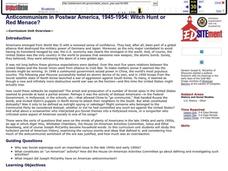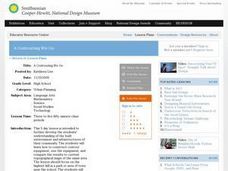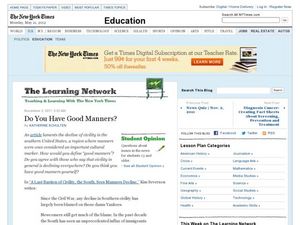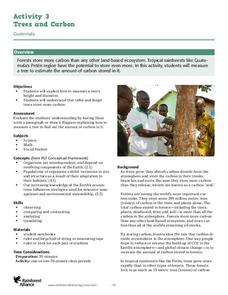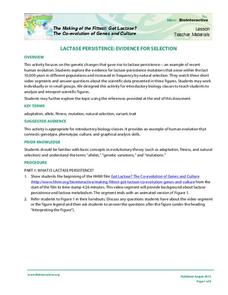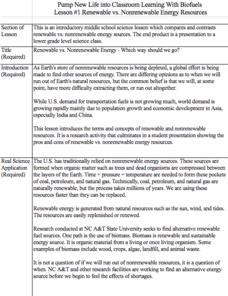Curated OER
Digital Video Lesson Plan: Brine Shrimp
Students participate in classroom experiment to gain better understanding of type of environment brine shrimp can best survive. Students then explore effects of common saltwater pollutants on survival of animals in sea.
Curated OER
Fall 1-The Rain Forest Biome and the Effects of Acid Rain - Biology Teaching Thesis
Students explain why rain forests have great biodiversity, and list each layer of a rain forest and tell an organism that lives in each. They identify the cause of acid rain and its affect on a rain forest. Students hypothesize the...
Curated OER
US City Quality of Life Analysis and Comparison
Students analyze US census data and criteria to compare and measure the quality of life in the country's fifty largest cities. After accessing the 2005 quality of life world report online, students conduct their study to compare three...
California Polytechnic State University
Australian Geography Unit
At the heart of this resource is a beautifully detailed PowerPoint presentation (provided in PDF form) on the overall physical geography of Australia, basic facts about the country, Aboriginal history, and Australia culture and lifestyle.
Global Oneness Project
The Man and the Wolf
Human attitudes toward the big bad wolf come into focus in a photo essay that asks viewers to consider their own feelings about the endangered species.
Global Oneness Project
Ancient and Modern Worlds
The old aphorism, "The road to Hell is paved with good intentions," might well serve as the title for a resource that asks viewers to consider the plight of the people of the Gamo Highlands, an area in southwestern Ethiopia. These...
Chicago Botanic Garden
Nature Walk and Ecosystem Introduction
A food web has no organism higher than a tertiary consumer because there wouldn't be enough energy left to sustain them. The fourth installment in a seven-part series begins with a nature walk to get pupils thinking about their...
Chicago Botanic Garden
Food for Thought: Climate Change and Trophic Cascades
Learners examines the arctic food web with a short video about polar bears and an article about bears and warming temperatures. They design an arctic food web and discuss the trophic cascade that could come from climate change.
Curated OER
KORN-TV Newsroom
Role-play to learn. Writers pretend to be a team of news writers. They research information about genetically engineered corn and the impact of biotech food products. Then create a video, Powerpoint, or oral presentation to present their...
Curated OER
Praire Biome Models
Fifth graders, in groups, list the physical characteristics of a biome and think of ways in which animals might have to adapt to live there and make a biome mobile ball that show the different types of habitats that shape the praire biome.
Curated OER
Witch Hunt or Red Menace? Anticommunism in Postwar America, 1945-1954
High schoolers investigate what constitutes an "un-American" activity and why Soviet espionage was such an important issue in the 1940's and 1950's. Joseph McCarthy's impact on American anticommunism is examined in this lesson. There are...
Curated OER
Antibodies and the Immune Response Lesson Plans - Biology Teaching Thesis
Students are introduced to bacteria and their role in biology and finishes with a lab experiment that focuses on antibiotics. They are given an overview of the important concepts involving bacteria and their potential resistance to...
Curated OER
A Contouring We Go
High schoolers examine the built environment and infrastructures of their community by constructing contour equipment, using the equipment, and comparing their results to current topographical maps of the same area
Curated OER
THE OCCUPATION OF KOREA BY JAPANESE IMPERIALIST FORCES
Students read and respond to a history of Korea. In this occupation lesson, students work in groups to research the effects of Japanese occupation and create an illustrated timeline. Students listen to a lecture and write an acrostic....
Curated OER
Exploring Arizona's Biotic Communities Lesson 1: Mapping Biotic Communities
As part of a unit on Arizona's biotic communities, young ecology learners create a map. They describe how humans and animals adapt in their habitat. They take notes and create graphic organizers from articles they read. Beautiful maps,...
Curated OER
Feeling the Heat
Pupils record temperatures at different locations around campus. They examine the results and draw conclusions about how materials and colors affect the amount of heat produced. They also analyze Los Angeles' temperature records over a...
Curated OER
Changing Planet: Infectious Diseases Classroom Activity
Here is a different approach: emerging epidemiologists first go home to interview family on the topic of infectious disease. Then they come to class and view a video and PowerPoint that explore how climate change may increase the...
Curated OER
Do You Have Good Manners?
Who cares about manners anyway? According to the New York Times, Mrs. Mason does. Learners read and consider an article which addresses the decline of manners and the impact it has on society. They answer seven critical thinking...
Rainforest Alliance
Trees and Carbon
You'll find everything but the kitchen sink here ... or just a carbon sink. In the activity, pairs or groups of middle school learners go outside and measure a tree's circumference and height to estimate its carbon storage potential and...
National Wildlife Federation
Master P in the House: An All School Energy and Climate Change Plan
A person in the US uses 20 times more energy than a person in India—that's a drastic difference! The final lesson in the 12-part series goes back to the initial energy audits, analyzes which room showed the most conservation of energy,...
Gobal Oneness Project
Building a Community of Trust
Barrio de Paz is the story of Nelsa Libertad Curbelo, a nun, who works with the gang youth of Guayaquil, Ecuador. The 17-minute documentary focuses on her explanations for the rise of gangs and for how gang culture reflects societal values.
Beyond Benign
The Big Melt: Arctic Ice Caps
Are the Arctic ice caps really melting out of existence? Junior climatologists examine the statistics of ice decline through four math-based lessons. Each activity incorporates data, climate information, and environmental impact into an...
Howard Hughes Medical Institute
Lactase Persistence: Evidence for Selection
What's the link between lactase persistence and dairy farming? Biology scholars analyze data to find evidence of the connection, then relate this to human adaptation. Working individually and in small groups, learners view short video...
Kenan Fellows
Renewable vs. Nonrenewable Energy Resources
Is one type of energy inherently good or bad? Young scientists explore energy resources in a week-long unit. After extensive research, groups create powerful position statements and presentations supporting their energy resource of choice.
Other popular searches
- World Population Growth
- World Population Maps
- Global Population Biology
- World Population Graph
- World Population Explosion
- World Population Increase
- Growth of World Population
- Geography World Population
- World Population Numbers
- World Population Model
- World Population Pyramids
- World Population Hunger



